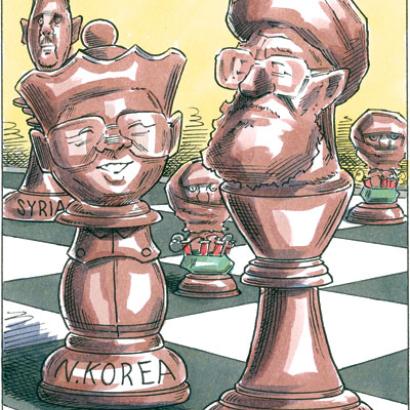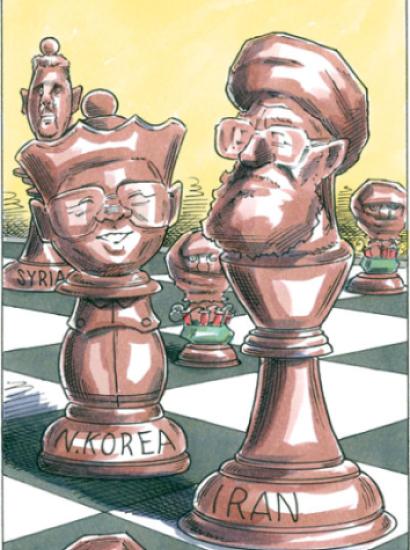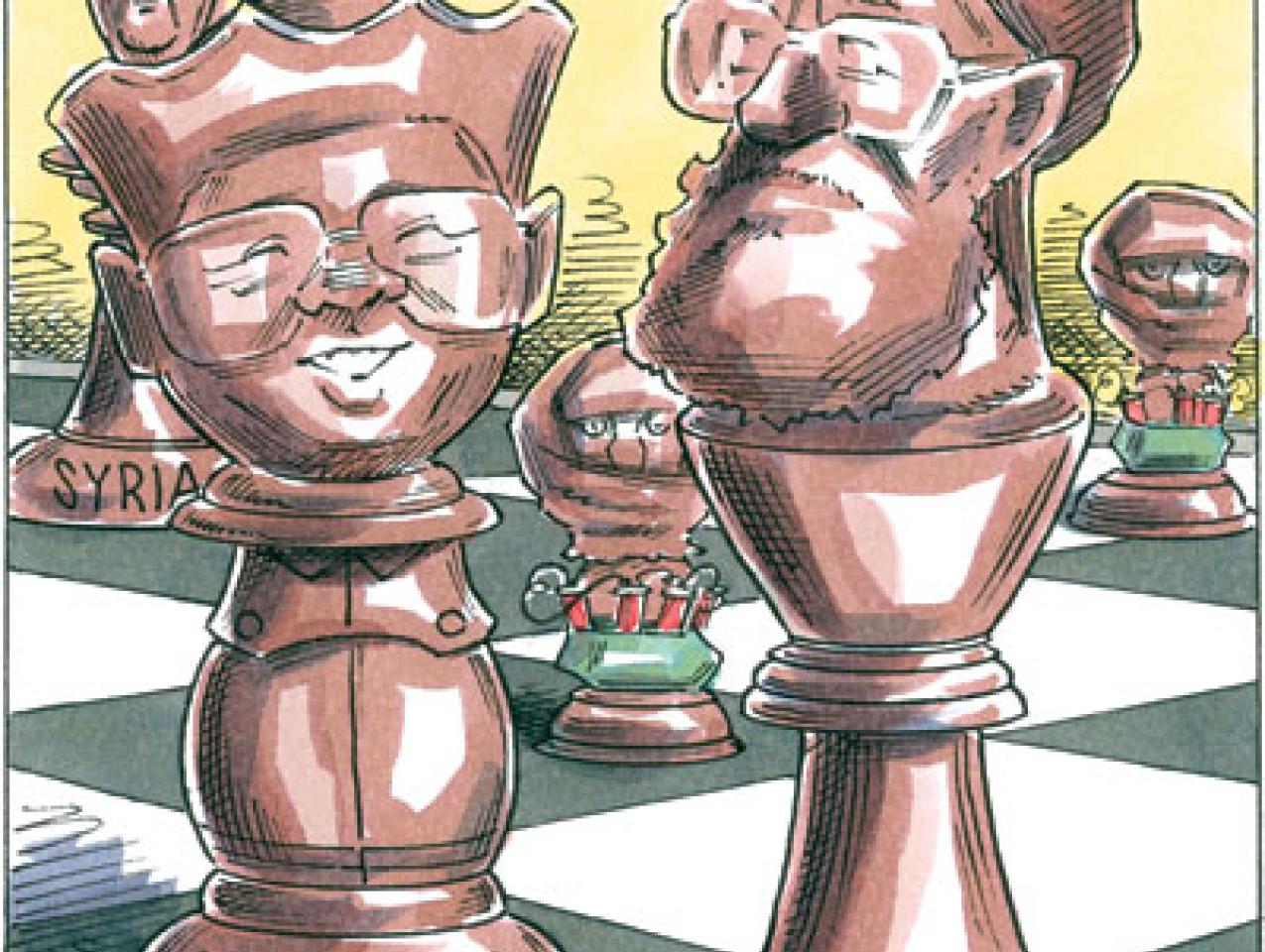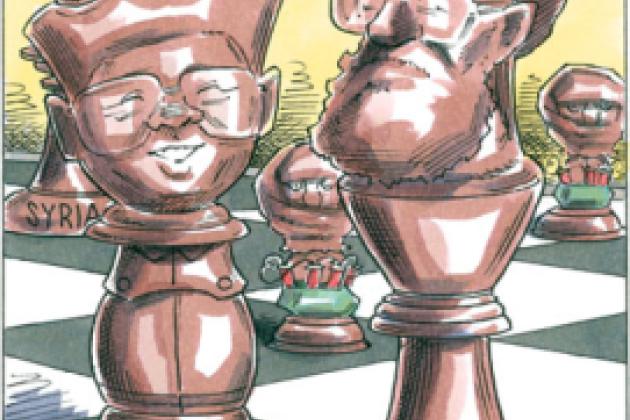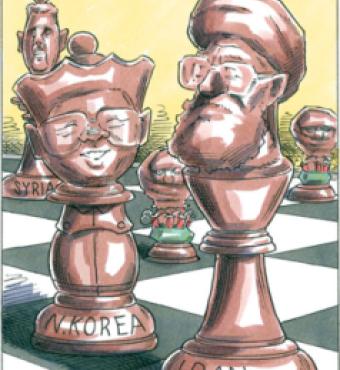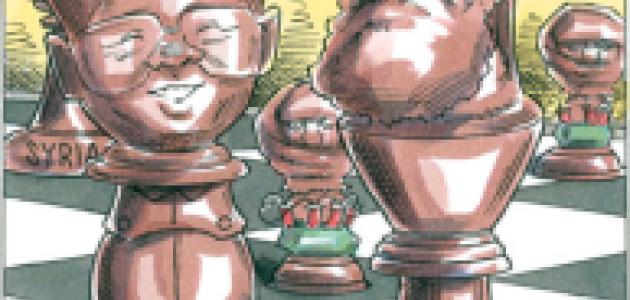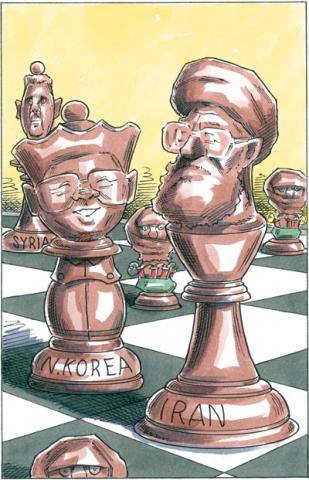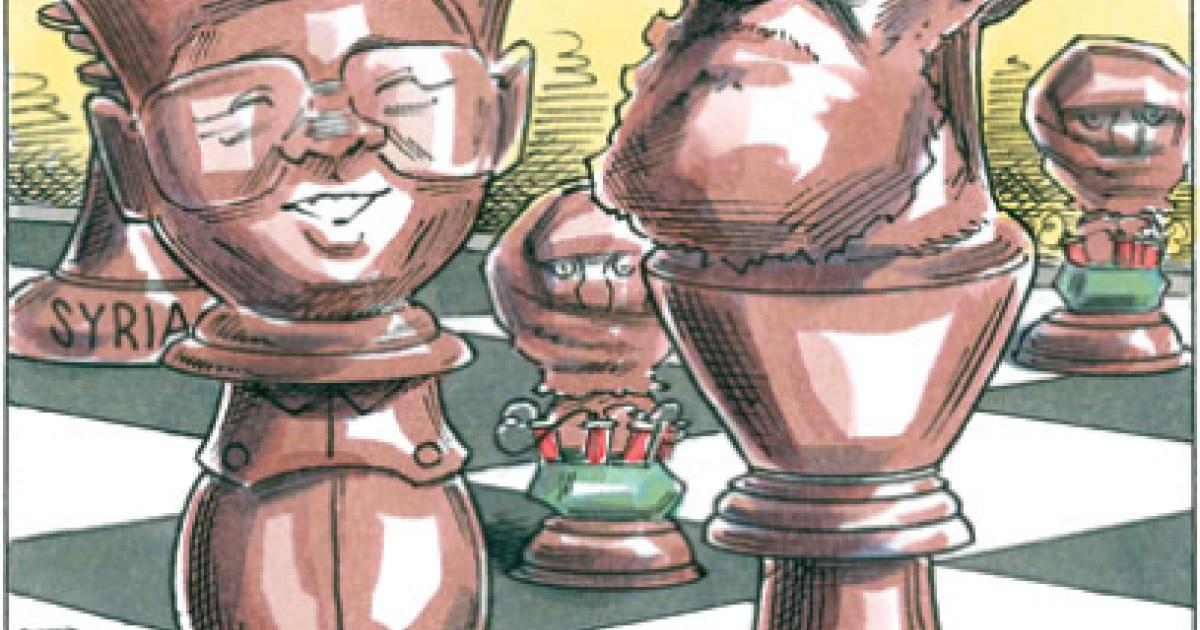If you listen to Bruce Bueno de Mesquita, and a lot of people don’t, he’ll claim that mathematics can tell you the future. In fact, the professor says that a computer model he built and has perfected during the past 25 years can predict the outcome of virtually any international conflict, provided the basic input is accurate. What’s more, his predictions are alarmingly specific. His fans include at least one current presidential hopeful, a gaggle of Fortune 500 companies, the Central Intelligence Agency, and the Department of Defense. Naturally, there is also no shortage of people less fond of his work. “Some people think Bruce is the most brilliant foreign policy analyst there is,” says one colleague. “Others think he’s a quack.”
Today, on a sunny summer day in San Francisco, Bueno de Mesquita appears to be neither. He’s relaxing in his stately home, answering my questions with exceeding politesse. Sunlight streams through the tall windows, the melodic sound of a French horn echoes from somewhere upstairs; his daughter, a musician in a symphony orchestra, is practicing for an upcoming recital. It’s all so complacent and genteel, which is exactly what Bueno de Mesquita isn’t. As if on cue, a question sets him off. “I found it to be offensive,” he says about a colleague’s critique of his work. “This is absolutely, totally, and utterly false,” he says about the attack of another.
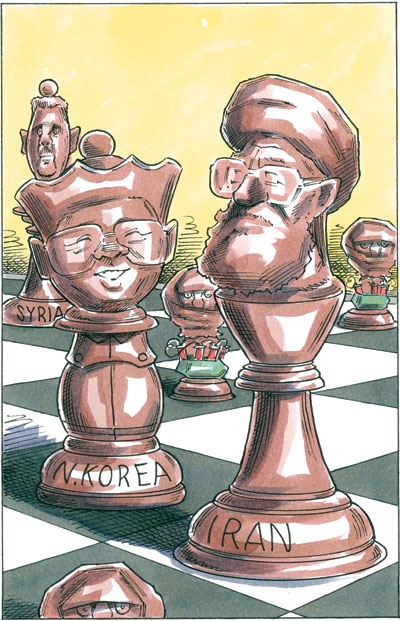
The criticism rankles because, to his mind, the proof is right there on the page. “I’ve published a lot of forecasting papers over the years,” he says. “Papers that are about things that had not yet happened when the paper was published but would happen within some reasonable amount of time. There’s a track record that I can point to.” And indeed there is. Bueno de Mesquita has made a slew of uncannily accurate predictions—more than 2,000, on subjects ranging from the terrorist threat to America to the peace process in Northern Ireland—that would seem to prove him right.
“The days of the digital watch are numbered,” Tom Stoppard famously quipped. After spending a few hours with Bueno de Mesquita, you might come to believe that so is everything else—numbered in game theory, an esoteric branch of mathematics used to analyze interaction. “Game theory is math for how people behave strategically,” Bueno de Mesquita says.
HITTING THE BULL’S-EYE
Bueno de Mesquita has big ideas, and he’s more than happy to put his career on the line for them. Back in March 2004, when Al-Qaeda bombed a Madrid train station, influencing the course of Spain’s general election three days later, a lot of U.S. security folks were nervous. Worried that Al- Qaeda might try something similar here in the run-up to the November 2004 presidential elections, the Pentagon hired Bueno de Mesquita to run some data through his forecasting model to tell them what to expect. The results were unequivocal. “I said there would be no homeland attack. I also indicated that bin Laden’s second-in-command, Ayman al-Zawahiri, would resurface around Thanksgiving 2004,” he says. Just after the elections in November that year, Zawahiri released a new videotape. Bueno de Mesquita was right on both counts. “One of the things government needs most is advice that’s not wishy-washy. I try to be as precise as I can.”
Bueno de Mesquita is the chairman of New York University’s Department of Politics, a senior fellow at the Hoover Institution, and the author of many weighty academic tomes. He regularly consults with federal agencies— most recently on such hot-button topics as Iran and North Korea— and has a new book out, The Strategy of Campaigning, which he co-wrote with Kiron K. Skinner, Serhiy Kudelia, and Condoleezza Rice (Skinner is a research fellow at the Hoover Institution, and Secretary of State Rice is a Hoover senior fellow on leave). His curriculum vitae, which details his various doctorates, academic appointments, editorial board memberships, writings, honors, awards, and grants, runs 17 small-font pages long.
He is wildly controversial, though. As one of the foremost scholars of game theory—or “rational choice,” as its political-science practitioners prefer to call it—Bueno de Mesquita is at the center of a raging hullabaloo that has taken over some of the most prestigious halls of learning in this country. Exclusive, highly complex mathematically, and messianic in its certainty of universal truths, rational choice theory is changing not only the way political science is taught but the way it’s defined.
To verify the accuracy of his model, the CIA set up a kind of forecasting face-off that arrayed predictions from his model against those of Langley’s more traditional in-house intelligence analysts and area specialists. “We tested Bueno de Mesquita’s model on scores of issues that were conducted in real time—that is, the forecasts were made before the events actually happened,” says Stanley Feder, a former high-level CIA analyst. “We found the model to be accurate 90 percent of the time.” Another study evaluating Bueno de Mesquita’s real-time forecasts of 21 policy decisions in the European Community concluded that “the probability that the predicted outcome was what indeed occurred was an astounding 97 percent.” What’s more, Bueno de Mesquita’s forecasts were much more detailed than those of the more traditional analysts. “The real issue is the specificity of the accuracy,” says Feder. “We found that DI [Directorate of National Intelligence] analyses, even when they were right, were vague compared to the model’s forecasts. To use an archery metaphor, if you hit the target, that’s great. But if you hit the bull’s-eye—that’s amazing.”
Bueno de Mesquita has made a slew of uncannily accurate predictions— more than 2,000, on subjects ranging from the terrorist threat to America to the peace process in Northern Ireland.
How does Bueno de Mesquita do this? “You start with a set of assumptions, as you do with anything, but you do it in a formal, mathematical way,” he says. “You break them down as equations and work from there to see what follows logically from those assumptions.” The assumptions he’s talking about concern each actor’s motives. You configure those motives into equations that are, essentially, statements of logic based on a predictive theory of how people with those motives will behave. From there, you begin building your mathematical model. You determine whether the predictive theory holds true by plugging in your data, numbers derived from scales of preferences that you ascribe to each actor based on the various choices they face.
The Prisoner’s Dilemma, a basic in game theory, explains it well: Two burglars are apprehended near the scene of a crime and are interrogated separately by the police. The police know these two goons did it, but they don’t know how, so they offer each one a deal. If they both confess and cooperate, they’ll both get a minor sentence of five years. If neither man confesses, they’ll both get only one year (for having been caught with some of the stolen loot on them). But, and here’s where it gets interesting, if one confesses and the other doesn’t, the one who confesses walks out scot-free while the other will do 10 years. What will they do? Will they trust each other and do what’s obviously in their best interest, which is to not confess? Based on game theory’s assumptions about human nature, the math derived from this dilemma tells you squarely that the two burglars will turn each other in.
“We have a corporate policy that we will not, on a commercial basis, use the model in campaigns,” he says. “We don’t think it’s appropriate to manipulate the democratic process.”
That illustrates the next incontrovertible fact about game theory: in the foreboding worldview of rational choice, everyone is a raging dirtbag. Bueno de Mesquita points to dictatorships to prove his point: “If you liberate people from the constraint of having to satisfy other people in order to advance themselves, people don’t do good things.” When analyzing a problem in international relations, Bueno de Mesquita doesn’t give a whit about the local culture, history, economy, or any of the other considerations that more traditional political scientists weigh. In fact, rational choicers like Bueno de Mesquita tend to view such traditional approaches with a condescension bordering on disdain: “the study of politics as an expression of personal opinion as opposed to political science,” he says dryly. His only concern is with what the political actors want, what they say they want (often two very different things), and how each of their various options will affect their career advancement. He feeds this data into his computer model and out pop the answers.
CONSULTANT EXTRAORDINAIRE
Although controversial in the academic world, Bueno de Mesquita and his model have proven popular in the private sector. In addition to his teaching responsibilities and consulting for the government, he also runs a successful private business, Mesquita & Roundell, with offices in Rockefeller Center. Advising some of the top companies in the country, he earns a tidy sum: Mesquita & Roundell’s minimum fee is $50,000 for a project involving two issues. Most projects involve multiple issues. “I’m not selling my wisdom,” he says. “I’m selling a tool that can help them get better results. That tool is the model.
“In the private sector, we deal with three areas: litigation, mergers and acquisitions, and regulation,” he says. “On average in litigation, we produce a settlement that is 40 percent better than what the attorneys think is the best that can be achieved.” Although Bueno de Mesquita’s present client list is confidential, past clients include Union Carbide, which needed a little help in structuring its defense after its 1984 chemical plant disaster in Bhopal, India, claimed the lives of an estimated 22,000 people; the giant accounting firm Arthur Andersen; and British Aerospace during its merger with GEC-Marconi.
But there are limits to what his company will do. For example, Bueno de Mesquita may already know, but he won’t say, who’ll succeed George W. Bush in the White House. “We have a corporate policy that we will not, on a commercial basis, use the model in campaigns,” he says. “We don’t think it’s appropriate to manipulate the democratic process. We won’t take a client who wants to manipulate U.S. government policy, even if we agree with the manipulation. And we won’t take a foreign client whose objectives are contrary to the objectives of the United States government.”
Meanwhile, he has just launched and is the director of NYU’s Alexander Hamilton Center. “The mission for the center is the application of logic and evidence to solving fundamental policy problems. Not to a bipartisan solution, but to a nonpartisan solution.”
One of his most recent assignments has been North Korea and its nuclear program. His analysis starts with the premise that what Kim Jong Il cares most about is his political survival. As Bueno de Mesquita sees it, the principal reason for Kim’s nuclear program is to deter the United States from taking him out by raising the costs of doing so. “The solution, then, lies in a mechanism that guarantees us that he not use these weapons and guarantees him that we not interfere with his political survival,” he says. Perhaps not coincidentally, the recent agreement that the United States reached with the government of Pyongyang closely resembles the one that Bueno de Mesquita’s model suggested: Kim agrees to dismantle his existing nuclear weapons but not his existing nuclear capability, in exchange for a large package of U.S. “foreign aid.”
When analyzing a problem in international relations, Bueno de Mesquita doesn’t give a whit about the local culture, history, economy, or any of the other considerations that more traditional political scientists weigh.
Recently, Buena de Mesquita has applied his science to come up with some novel ideas on how to resolve the Israeli-Palestinian conflict. “In my view, it is a mistake to look for strategies that build mutual trust because it ain’t going to happen. Neither side has any reason to trust the other, for good reason. Land for peace is an inherently flawed concept because it has a fundamental commitment problem. If I give you land on your promise of peace in the future, after you have the land, as the Israelis well know, it is very costly to take it back if you renege. You have an incentive to say, ‘You made a good step, it’s a gesture in the right direction, but I thought you were giving me more than this. I can’t give you peace just for this, it’s not enough.’ Conversely, if we have peace for land—you disarm, put down your weapons, and get rid of the threats to me and I will then give you the land—the reverse is true: I have no commitment to follow through. Once you’ve laid down your weapons, you have no threat.”
AN UPHILL SLOG
Bueno de Mesquita’s first foray into forecasting controversy took place in 1984, when he published an article in PS, the flagship journal of the American Political Science Association (APSA), predicting who would succeed Iran’s ruling Ayatollah Khomeini on his death. His rudimentary forecasting model was different from anything seen before in that it was not designed around one particular foreign policy problem but could be applied to any international conflict. “It was the first attempt at a general mathematical model of international conflict,” he says. His model predicted that, on Khomeini’s death, an ayatollah named Hojatolislam Khamenei and an obscure junior cleric named Akbar Hashemi Rafsanjani would emerge to lead the country together. Even more improbably, Khomeini had already designated his successor, and it was neither Ayatollah Khamenei nor Rafsanjani. Khomeini’s stature among Iran’s ruling clerics made it inconceivable that they would defy their leader’s choice. At the APSA meeting subsequent to the article’s publication, Bueno de Mesquita was roundly denounced as a quack by the Iran experts—a charlatan peddling voodoo mathematics. “They said I was an idiot, basically. They said my work was evil, offensive, that it should be suppressed,” he recalls. “It was a very difficult time in my career.” Five years later, when Khomeini died, lo and behold, Iran’s fractious ruling clerics chose Khamenei and Rafsanjani jointly to lead the country. At the next APSA meeting, the man who had been Bueno de Mesquita’s most vocal detractor publicly apologized to him.
The most pointed criticism of rational choice is that very little crosspollination takes place between academics and policy makers. Changing that, says Bueno de Mesquita, is just a matter of time.
Bueno de Mesquita had arrived and so, too, had rational choice theory. Rational choicers began sprouting up in political-science departments around the country and, say their critics, strangling anyone and anything in their way. By 2000, according to one estimate, some 40 percent of all articles published in the prestigious American Political Science Review had rational choice as a theme. Increasingly, graduate students in political science viewed a fluency in formal mathematic modeling as a prerequisite for career advancement. And the leaps in technology taking place only fueled rational choice’s advance: faster, more powerful computers allowed rational choicers to build bigger, more complex models that could be applied to more complex situations.
Naturally enough, an intellectual counteroffensive has been launched in the political science community, which culminated at a raucous APSA meeting in 2001 at San Francisco’s Hilton Hotel with the open revolt of a group of major-league political scientists who, one by one, took to the podium to rail against rational choice and its encroaching methodological orthodoxy. Ultimately, the “dissidents” did win some concessions. “The APSA had become dominated by those practicing so-called rigorous analyses,” says Stephen Walt of Harvard’s Kennedy School of Government. “Now the pendulum has swung back a bit.”
For Bueno de Mesquita, getting his methodology accepted by the policymaking establishment remains somewhat of an uphill slog. The most pointed criticism of rational choice has been that, unlike traditional political science, very little cross-pollination takes place between rational choice academics and government policy makers. Bueno de Mesquita says that it’s just a matter of time before that changes. “Because people who are in a position to appoint people weren’t trained in this way, they don’t feel as comfortable as with people who were trained in what I would describe as a less rigorous form of study of politics. And, so, the folks who do more rigorous work typically don’t get invited in,” he says. Of course, the same was true of economics 40 years ago when nontechnical types like John Kenneth Galbraith dominated the field. Paul Samuelson and Milton Friedman changed all that, and Bueno de Mesquita sees himself playing the same role in politics.
Bueno de Mesquita himself remains unfazed, ever certain that rational choice will ultimately prevail. “When I moved to Rochester in 1973, if you wanted to be trained in this kind of political science, you could go to Rochester, period,” he says. “Ten years later, you could go to Rochester, Caltech, and Washington University in St. Louis. If you asked me today, you could go to the places I just mentioned, and you could go to NYU, you could go to Stanford—there’s a long list of places you could go. Except, of course, Harvard. But it will happen there, too. I’m on their syllabus.”
A version of this essay appeared in the November/December 2007 issue of Good magazine.








